Speakers

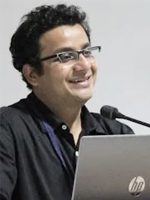
Dr. Indranil Banerjee
Associate Professor, IIT Jodhpur
Dr. Indranil Banerjee is an associate professor in the department of Bioscience and Bioengineering, Indian Institute of Technology, Jodhpur. He has been working in the field of biomaterial and tissue engineering for the last 14 years. He did his double bachelors (B.Sc in Chemistry (Hons) and B.Tech in Chemical Technology) and Masters (M.Tech. in Pharmaceutical and Fine Chemical Technology) from the University of Calcutta. Later, he pursued his PhD in Biotechnology from the Indian Institute of Technology, Kharagpur. He started his academic career as an assistant professor in the department of Biotechnology and Medical Engineering, National Institute of Technology Rourkela. He was invited as a guest scientist to the Max Planck Institute of Intelligent Systems, Stuttgart, Germany. He is an associate editor of Frontiers in Medical Technology (Medtech data analytics). He has so far authored more than 100 research articles and book chapters altogether and edited a number of books.
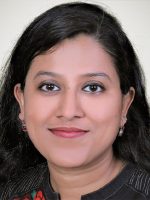
Dr. Swati Biswas
Professor, Birla Institute of Technology and Science-Hyderabad Campus
Prof. Swati Biswas completed B. Pharm and M. Pharm from Jadavpur University. After serving as a lecturer in a pharmacy College in Sikkim for a brief period, Prof. Biswas moved to the USA in 2003 to join the Department of Pharmaceutical Sciences at Wayne State University, Detroit, Michigan, USA as a research fellow. She received the prestigious Thomas C. Rumble fellowship to join the doctoral program. After completing her doctoral study in 2008, she joined the same lab as a postdoctoral fellow and, after one year, joined as a postdoctoral research associate in the Center for Pharmaceutical Biotechnology and Nanomedicine, Northeastern University, Boston, Massachusettes.
The zeal to work vigorously on research ideas made her choose academia as the career option. Prof. Biswas started her independent research career as an Assistant Professor at BITS Pilani, Hyderabad (India), after moving to India in 2013. In 2018, she was promoted to Associate Professor, and last year, she was promoted to professor in the Department of Pharmacy.
Prof. Biswas received the honor of serving as an Editorial Advisory Board member of the journal published by the American Chemical Society, Molecular Pharmaceutics (2022-2023). She was a guest editor of their Asia-specific issue, “Advances in Molecular Pharmaceutical Research from Asia. The journal published an interview-based article about her scientific journey titled “Voices in Molecular Pharmaceutics: Meet Dr. Swati Biswas, an Academic Developing Therapeutic Weapons to Kill Cancer Cells”. She is the associate editor of the journal, Frontiers in Biomaterials Sciences in the specialty section of Delivery Systems and Controlled Release. She received the DBT-Bio-CARe award in 2013 and travel grant from ICMR.
Prof. Biswas has 115 publications and 13 Indian and 2 US patents. She has written 12 book chapters and presented papers in 112 conferences. Prof. Biswas has five ongoing projects in the lab. She has a total of 6087 citations, h-index. 37, and an i-10 index of 74, as per the Google Scholar report. She is supervising 8 PhD students currently in her lab. The lab has been generously funded by DST, DBT, ICMR, IISC, CSIR, Sun Pharmaceutical Advanced Research Company, Daewoong Pharmaceuticals, Dr. Reddy’s Lab, and Hetero Labs, Hyderabad.
Prof. Biswas has been working in nanomedicine research for the last fifteen years. She has been in the list of 2 % of scientists in the single-years from 2019-2022 in Pharmacology and Pharmacy/Nanoscience & nanotechnology/ Clinical Medicine. Professor Swati Biswas was enlisted as a highly cited researcher in 2022 by Clarivate, where the database included only 6,938 researchers worldwide, demonstrating significant contribution in publishing papers that rank in the top of 1 % by citations.
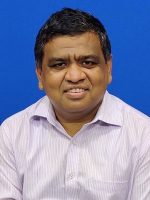
Prof. Bikramjit Basu
Professor, Indian Institute of Science (IISC)
Dr. Bikramjit Basu is a Professor at the Indian Institute of Science, Bangalore, India. He has been pursuing research at the confluence of Materials Science, Biological Science and Medicine. His research group has effectively applied the principles and tools of these disciplines to develop next generation implants and bioengineering solutions to address unmet clinical needs for musculoskeletal, dental, and neurosurgical applications; thereby impacting human healthcare. A Chartered Engineer of the UK, he has the unique distinction of being the only ceramic scientist from India to get elected to all the major international societies and academies, including the World Academy of Ceramics (2023), the European Ceramic Society (2023), the American Ceramic Society (2019). In India, he is the only engineering scientist to get elected as a Fellow of all the National Academies of Engineering, Science and Medicine, including the Indian National Science Academy (2021), Indian Academy of Sciences (2020), American Ceramic Society (2019), National Academy of Medical Sciences (2017), Indian National Academy of Engineering (2015), Society for Biomaterials & Artificial Organs (2014) and National Academy of Sciences, India (2013). Internationally, he is an elected fellow of the International Union of Societies for Biomaterials Science and Engineering (2020), International Academy of Medical and Biological Engineering (2017) and the American Institute of Medical and Biological Engineering (2015). He is a recipient of India’s most prestigious Science and Technology award, Shanti Swarup Bhatnagar Prize (2013) from the Prime Minister of India; and globally competent awards, like Humboldt Research Award from the Alexander von Humboldt foundation (2022), and International Richard Brook Award from the European Ceramic Society (2022). As the current President (2021-24) of the Society for Biomaterials and Artificial Organs India (1000+ members across India, US and Europe) and the Chair of the Bioceramics Division of the American Ceramic Society, ACerS (2022-23), he has brought transformative changes to significantly enhance international visibility of the biomaterials programs in different countries and to bring together key stakeholders (industry professionals and clinicians), while inspiring several hundreds of young researchers in Bioceramics area across the world.
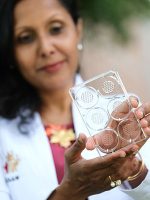
Dr. Charu Chandrasekera
Executive Director, Canadian Centre for Alternatives to Animal Methods
Dr. Charu Chandrasekera is the founder and executive director of Canada’s national hub and the international interface dedicated exclusively to animal-free methods, the Canadian Centre for Alternatives to Animal Methods. She is an experienced biomedical scientist, a former animal researcher, a science policy expert, and an animal lover. Through multidisciplinary partnerships among diverse stakeholders, Dr. Chandrasekera promotes the replacement of animals in Canadian biomedical research, education, and regulatory testing through 21st century science, innovation, and ethics.
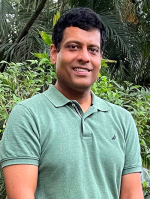
Prof. Kaushik Chatterjee
Professor, Indian Institute of Science
Dr. Kaushik Chatterjee joined the Indian Institute of Science, Bangalore, in 2011, where he is currently a Professor in the Department of Materials Engineering and the Department of Bioengineering. His research group focuses on materials for biomedical applications. Specifically, they are using 3D printing and additive manufacturing technologies to prepare medical devices and tissue scaffolds.
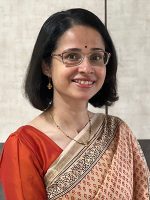
Dr. Prajakta Dandekar Jain
UGC Assistant Professor in Engineering Sciences, Institute of Chemical Technology, Mumbai
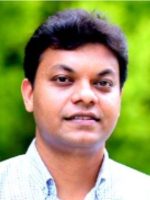
Prof. Biman Mandal
Professor, IIT Guwahati
Prof. Biman B. Mandal is a Professor in the Department of Biosciences and Bioengineering, School of Health Science and Engineering and Centre for Nanotechnology, IIT Guwahati. Due to his seminal contributions to the field of Biomaterials, Tissue Engineering and 3D Organ Bioprinting, Prof. Mandal is included as one of the “75 under 50 Scientists shaping today’s India” a list prepared by DST, Govt. of India. He is included in “World Top 2% Scientist List” prepared by Stanford University USA. Prof. Mandal is an Associate Editor of ACS Biomaterials Science and Engineering and Editorial Board member of 10 International high impact Journals. He was the President of STERMI (Society for Tissue Engineering and Regenerative Medicine India) 2021-2024.
Prof. Mandal has published more than 190 research articles with over 11,600+ citations and has an H-index of 60. He has 23 patents and licensed 05 healthcare technologies to Industry with 01 product already in market. Prof. Mandal has bagged prestigious Young scientist awards from the Indian National Academy of Sciences (INSA) and National Academy of Sciences India (NASI). He has won NASI-SCOPUS Young Scientist award for his high citations and B. M. BIRLA Science Prize in Biology along with 06 other prestigious young scientist awards. Recently he has been awarded the prestigious SWARNAJAYANTI Fellowship & S. RAMACHANDRAN National Bioscience Award by DST and DBT in Life Sciences for the year 2020-2021.
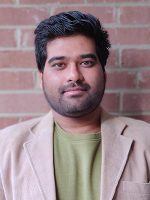
Dr. Sumit Murab
Assistant Professor, IIT Mandi
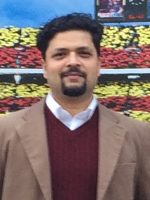
Dr. Baiju Nair
Associate Professor and Head of the Department of Bioscience and Engineering, NIT Calicut
Dr. Baiju G Nair is an Associate Professor and Head of the Department of Bioscience and Engineering at NIT Calicut, where he leads the Functional Materials and Tissue Engineering Laboratory. His academic journey began with an MS and Doctor of Engineering in Bionanofusion Technology as a MEXT fellow in Japan, showcasing his dedication to pioneering research.
After completing his doctoral degree, Dr. Nair was honored with the prestigious JSPS fellowship at Riken, Japan, in 2012, followed by recognition through the SPDR program for young scientists in 2014. His commitment to excellence was further acknowledged in 2023 with the Bridge Fellowship by JSPS.
Dr. Nair is renowned for his prolific research contributions, evident through numerous peer-reviewed articles, books, and secured patents in his specialized domains. His outstanding achievements include receiving the Young Scientist Award from the Biomedical Engineering Forum in Japan in 2017 and the Best Research Award at Nanocon in the Czech Republic in 2011.
His research interests encompass a broad spectrum, ranging from tissue engineering and 3D & 4D bioprinting to biomaterials, DNA and RNA nanotechnology, and exploring small molecules from extremophiles. Dr. Nair’s innovative work enriches the scientific community and promises groundbreaking advancements in healthcare and biotechnology.
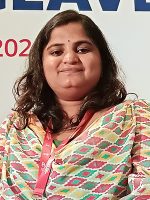
Dr. Manansa Nune
Associate Professor, Manipal Institute of Regenerative Medicine (MIRM), Manipal Academy of Higher Education (MAHE)
- One of the 20 Indian women scientists invited to participate in the inaugural ASEAN-INDIA Women Scientists Conclave (AIWSC) co-organized by Singapore’s Agency of Science, Technology and Research (A*Star) with India’s Department of Science & Technology and Anushandhan National Research Foundation (ANRF) with the support of the ASEAN Secretariat held from 24-26 April 2024, Singapore.
- American Chemical Society (ACS) membership as an appreciation in recognition for being an ACS peer-reviewer in March 2024.
- SBAOI-MAHE Young Scientist Award and first prize for her talk at the International Conference on Biomaterials, Regenerative Medicine and Devices (BIO-Remedi 22) held at IIT Guwahati from 14th-18th December 2022.
- Awarded Life member of the Society for Biomaterials & Artificial Organs India (SBAOI) and the Society for Tissue Engineering & Regenerative Medicine India (STERMI).
- Certificate of Appreciation awarded for being the resource person for the faculty development program titled “Institutional Committee for Stem Cell Research: Guidelines and Screening Procedures for Protocols” organized by Manipal College of Dental Sciences, Mangalore on January 28th 2022 & July 2nd 2021.
- Received about 7 research grants and published about 20 articles, 2 book chapters and made 40 conference presentations.
- Guest editor for special issues in ‘JoVE’ and ‘Frontiers in Neuroscience’ journals
- Peer-reviewer for 24 journals
- Supervised 5 Ph.D., 3 JRF, 1 M.Tech, 13 M.Sc. and 9 B.Tech. Interns.
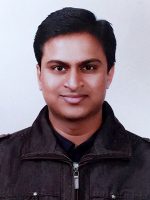
Dr. Falguni Pati
Associate Professor, Department of Biomedical Engineering, Indian Institute of Technology Hyderabad
Dr. Falguni Pati, currently an Associate Professor and the Head of the Department of Biomedical Engineering at IIT Hyderabad, boasts an impressive academic and research background. He obtained his Ph.D. from IIT Kharagpur and gained valuable experience through postdoctoral appointments at POSTECH, South Korea, and KTH, Sweden, before joining IITH in 2015. Dr. Pati leads the Biofabrication and Tissue Engineering (BioFabTE) Lab at IITH, where the primary focus lies in advancing tissue engineering through 3D bioprinting technology. His lab endeavors to develop innovative tissue-engineered products and in vitro tissue/organ models, with a keen interest in bioinks, bioprinting methods, and technologies to produce tissue analogs-on-demand. Dr. Pati’s contributions extend beyond research into academia. He designed and implemented a pioneering course on Biofabrication for undergraduate and postgraduate students at IITH, the first of its kind in India. Additionally, he has been teaching the course “Organ Printing” on NPTEL for the last three years, further disseminating knowledge in this specialized domain.
Recognition for his impactful work includes the prestigious Ramalingaswami fellowship awarded to him in 2016. Dr. Pati’s research endeavors have been supported by various funding agencies such as DST-SERB, DBT, ICMR, and MoE, underscoring the significance and relevance of his research initiatives.
Notably, in 2022, Dr. Pati’s team achieved a significant milestone by securing the Sree Ramakrishna Paramahamsa Research Grant worth 3 Cr in Biomedical Sciences. This grant was awarded for the clinical trial of their biomimetic hydrogel, showcasing the potential impact of their research in addressing blinding corneal diseases.
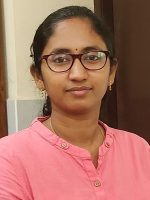
Dr. Janani Radhakrishnan
Scientist, National Institute of Animal Biotechnology (NIAB)
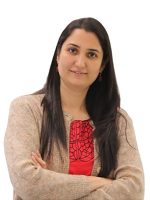
Prof. Neetu Singh
Professor, Indian Institute of Technology Delhi
Neetu Singh obtained her Bachelors and Masters degrees from University of Mumbai and her doctoral degree in chemistry from Georgia Institute of Technology, Atlanta, USA. She obtained her postdoctoral training at the Harvard-MIT Division of Health Sciences and Technology, USA.
Prof. Singh returned to India and joined IIT Delhi as an Assistant Professor in the Center for Biomedical Engineering in 2014.
In her current program at IITD, she is establishing a research program that explores systematic probing into nanomaterials biological activity and formulates “design rules” for developing nanosystem for specific bio-medical & healthcare applications. Her group at IIT Delhi is integrating concepts and skills from chemistry, materials science, and biology to design nano-structured materials with enhanced functionalities for applications in biomedical implants, disease diagnostics, tissue engineering and regenerative medicine.
Her scientific contribution has been recognized by several awards and honors. She is the recipient of “Innovative Young Biotechnologist award 2013” by Department of Biotechnology (DBT), India. In 2019, she received the Veena Arora young researcher award by IIT Delhi, which recognizes best research contributions at IIT Delhi by faculty below 40 years. She is the receipt of NASI-SCOPUS young Scientist award for “Women-in Science”-2019; DBT’s Janaki Ammal Young scientist -2021 and Science and Engineering Research Board (SERB)-India, POWER Fellow 2021. She is also a mentor for an IITD start-up, “Kriya-Labs”, that is bringing valorization to agro waste by technological solutions.
She is also an editorial advisory board member of the journal Bioconjugate Chemistry (a pioneering publication of American Chemical Society) and a new Springer journal – In Vitro Models.
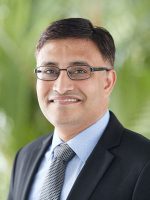
Dr. Gopu Sriram
Dr., Faculty of Dentistry, National University of Singapore
Dr. Gopu Sriram is a tenure-track Assistant Professor at the Faculty of Dentistry, and Department of Biomedical Engineering, National University of Singapore. He also serves as the Co-Thrust Lead at the NUS Centre for Additive Manufacturing, where he directs the utilization of 3D printing, biofabrication, and additive manufacturing technologies for applications in oral and craniofacial healthcare.
Dr. Sriram leads the Tissue Mimetics Laboratory, where his team’s research focuses on the application and convergence of microfluidics, 3D organotypic cultures, and 3D printing-based biofabrication technologies for dental applications. Through the application of these technologies, his team develops animal alternative models to explore host-microbiome-material interactions in periodontal (gum) disease and advance the regeneration of dental, oral, and craniofacial tissues.
Dr. Sriram and his mentees have garnered numerous accolades in recognition of their outstanding contributions to dental research, animal alternatives and excellence in teaching. Furthermore, some of his research has translated to the establishment of a Singapore-based startup dedicated to the creation of 4D barrier tissue models for cruelty-free testing of consumer-care products.
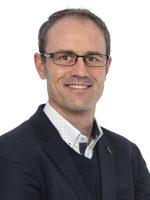
Prof. Tim Woodfield
Professor, University of Otago
Tim Woodfield is Professor of Regenerative Medicine, Department of Orthopaedic Surgery & Musculoskeletal Medicine at University of Otago Christchurch and Director of the University of Otago Centre for Bioengineering & Nanomedicine. His research involves development of photo-crosslinkable bioinks and bioresins, 3D Bioprinting, spheroid bioassembly and additive manufacturing of medical devices applied to orthopaedics/regenerative medicine. He has >150 publications (h-index: 51) and obtained >NZ$28M in competitive research funding.
He has received a number of prestigious awards including a Rutherford Discovery Fellowship from the Royal Society of New Zealand Te Apärangi and the University of Otago Research Gold Medal. He received the 2020 Research Excellence Award from the Australasian Society for Biomaterials & Tissue Engineering (ASBTE), and was awarded Fellow Biomaterials Science & Engineering (FBSE).
He is the current President of the International Society for Biofabrication, and former President of the Australasian Society for Biomaterials & Tissue Engineering. He is a member of the Tissue Engineering and Regenerative Medicine International Society Asia Pacific Council (TERMIS-AP) and is an Executive Editorial Board member for Biofabrication journal, as well as Editorial Board Member for Advanced Healthcare Materials, APL Bioengineering and Associate Editor for Frontiers in Bioengineering & Biotechnology.

Contact us
Send us an email by filling in the contact form here.
U.S.: +1 (833) 235-5465
EU: +46 31-12 87 00
India: +91 (0) 98808 58741
Japan: +81 (75)746-3032
Singapore: +65 8750 2284





